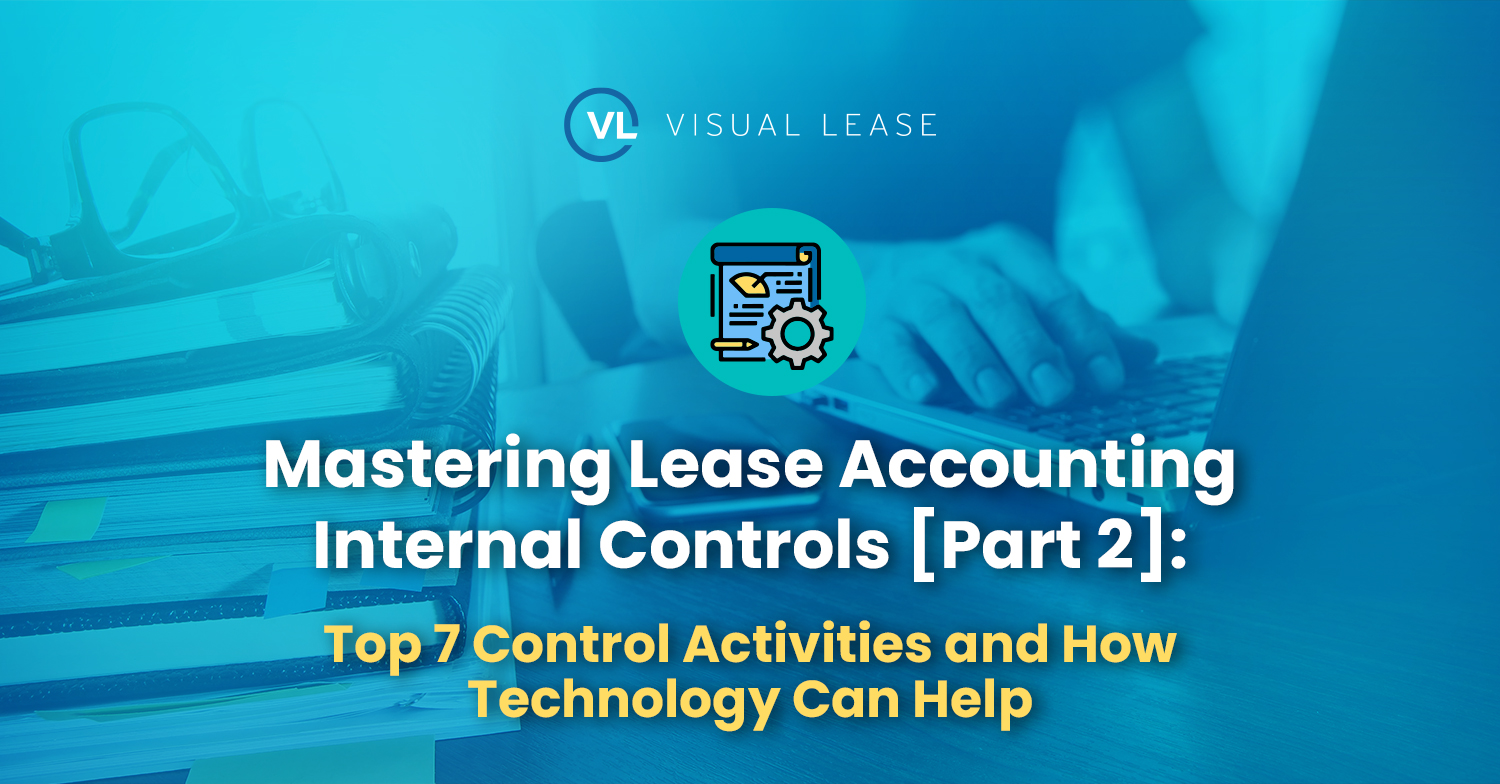
This is part II of our Mastering Lease Accounting Compliance series. If you missed part I, you can read it here.
Adopting a lease accounting standard can have a significant impact on your organization’s balance sheet and financial statement footnotes. Moreover, it also expands lease disclosures and comes with the added burden of complying with lease accounting standards. In this post, we’ll share insights on controls and how technology can help organizations meet the challenges of lease accounting compliance.
What are some of the top lease accounting control activities?
Today we’re highlighting 7 of the top control activities that can help organizations with lease accounting compliance.
These activities can be classified into two buckets: control activities and monitoring activities.
The control activities include standardization of documentation, separation of duties, authorization and approvals, system access controls, and safeguarding of assets. The monitoring activities are audit trail and reconciliation.
What are the Control Activities?
1. Standardization of Data and Documentation
Every lease agreement is different, and the concept of standardization helps control both documents as well as the data they contain. Standardization helps control chronology such as original lease, amendments, renewals, etc. Also, completeness of both the document and package as well as any missing data elements and consistency that everything shows up in the same place within the platform. It also provides for ease of auditability through input templates defined, data fields, a contract repository, and the ability to set up fields for clauses, this is truly the concept of a single source of truth.
2. Separation of Duties
Separation of duties is a critical control activity in lease accounting compliance. Organizations should ensure that folks in accounting should not be allowed to make changes to the system for things that can be operationally critical, such as term dates, and other aspects of the lease that are critical to the operations of that lease. User-defined roles can be set up in a system to ensure that lease admins have a certain level of activity within the system, while lease accountants can perform other activities, but never the two shall meet, so to speak.
3. Authorization and Approvals
Authorization or approvals is another control activity that intersects with system access controls. Someone who is not in the system daily making changes, updates, etc. should be the one that approves the change log right these changes and reviews the log. They shouldn’t be making it the same way that someone who is inputting data daily is.
4. System Access Controls
System access controls are vital in ensuring the security and integrity of lease data. Setting up user profiles that grant specific access levels is a good way to restrict access to sensitive data. For example, you can set up different profiles for admins, accountants, supervisors, reviewers, and auditors. Additionally, security features like SSL and two-factor authentication provide extra security not just for internal users but also for external users accessing the system.
5. Safeguarding of Assets
Lease agreements often involve valuable assets that are critical to a company’s operations. Thus, it’s important to safeguard these assets by ensuring that you have a system in place that alerts you to critical dates and events related to lease agreements. For instance, if a lease agreement is coming to an end, you should be notified in advance, giving you enough time to renew the lease or negotiate favorable rates. Failure to safeguard these assets can result in a loss of critical business locations or unfavorable rates, which could be detrimental to the business.
What are the Monitoring Activities?
The monitoring activities are audit trail and reconciliation.
6. Reconciliation
Reconciliation is a vital process in lease accounting that ensures the accuracy and completeness of lease data. It involves comparing lease data across different periods to identify any discrepancies or errors. However, reconciliation is not 100% satisfied by the system, and compensating user controls are necessary to complete the process properly. Fortunately, lease accounting software provides a variety of role reports that enable the reconciliation of different activities within the lease accounting process.
7. Audit Trail
Auditing is a critical part of lease accounting that ensures compliance with lease accounting standards and regulations. In addition to compliance, audit trails are also essential in establishing the accuracy and completeness of lease data. In Visual Lease, for example, there’s a quantitative disclosure report that provides a summary of all the information needed to pop into your footnote. The report also allows users to drill down into each of those summary numbers to see how they were built up. This feature provides an audit trail that users can use to establish the detail behind those numbers. Furthermore, the audit trail can be handed off to auditors to test the report and the audit trail that has that drilled-down feature.
How can I implement better controls?
Adopting a lease accounting standard can have a significant impact on an organization’s balance sheet and financial statement footnotes. To comply with these standards, organizations need to implement controls around accounting and reporting, which must be audited and continuously monitored. Collaboration between departments is necessary to ensure compliance, and auditors may need to engage with folks outside of accounting to test the controls in place. Fortunately, technology like Visual Lease can help organizations meet the challenges of lease accounting compliance. To learn more about Visual Lease’s Lease Accounting solutions, click here.























